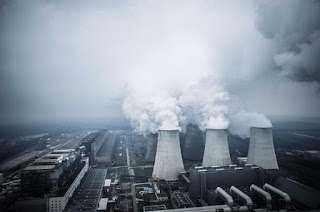 |
| A coal-fired power plant in Germany in 2014. |
Topics: Climate Change, Global Warming, Greenhouse Gases
The correct term is Anthropgenic Climate Disruption, meaning that you don't experience what you're used to getting weather-wise.
Some practical symptoms I'm sure some of us are experiencing at this warmer-than-normal winter: I just finished a second round of antibiotics after a high temperature of 102.4, BP a very concerning 160/90; a third for my wife since her second antibiotic - Levaquin - she had an allergic reaction to, landing her in the emergency room at Vassar Hospital. I was suddenly on night shift again Friday morning...
Last winter was brutally cold, but that cold likely killed a lot of aerosols that normally wouldn't be in the atmosphere in New York. So, though minus 12 wasn't desirable, it was at least for the northeast, "normal."
Carbon is pouring into the atmosphere faster than at any time in the past 66 million years—since the dinosaurs went extinct—according to a new analysis of the geologic record. The study underscores just how profoundly humans are changing Earth’s history.
The carbon emissions rate is ten times greater today than during the prehistoric hot period that is the closest precedent for today's greenhouse warming.
That period, known as the Paleocene-Eocene Thermal Maximum (PETM), was marked by a massive release of the Earth's natural carbon stores into the atmosphere. (It’s not clear what caused the PETM, but volcanic eruptions and methane gas release are suspects.) The excess carbon triggered a 5°C (9°F) temperature increase, along with drought, floods, insect plagues, and extinctions. (Read more about this period of “Hothouse Earth.”)
National Geographic: Earth Hasn’t Heated Up This Fast Since the Dinosaurs’ End
Marianne Lavelle
Comments